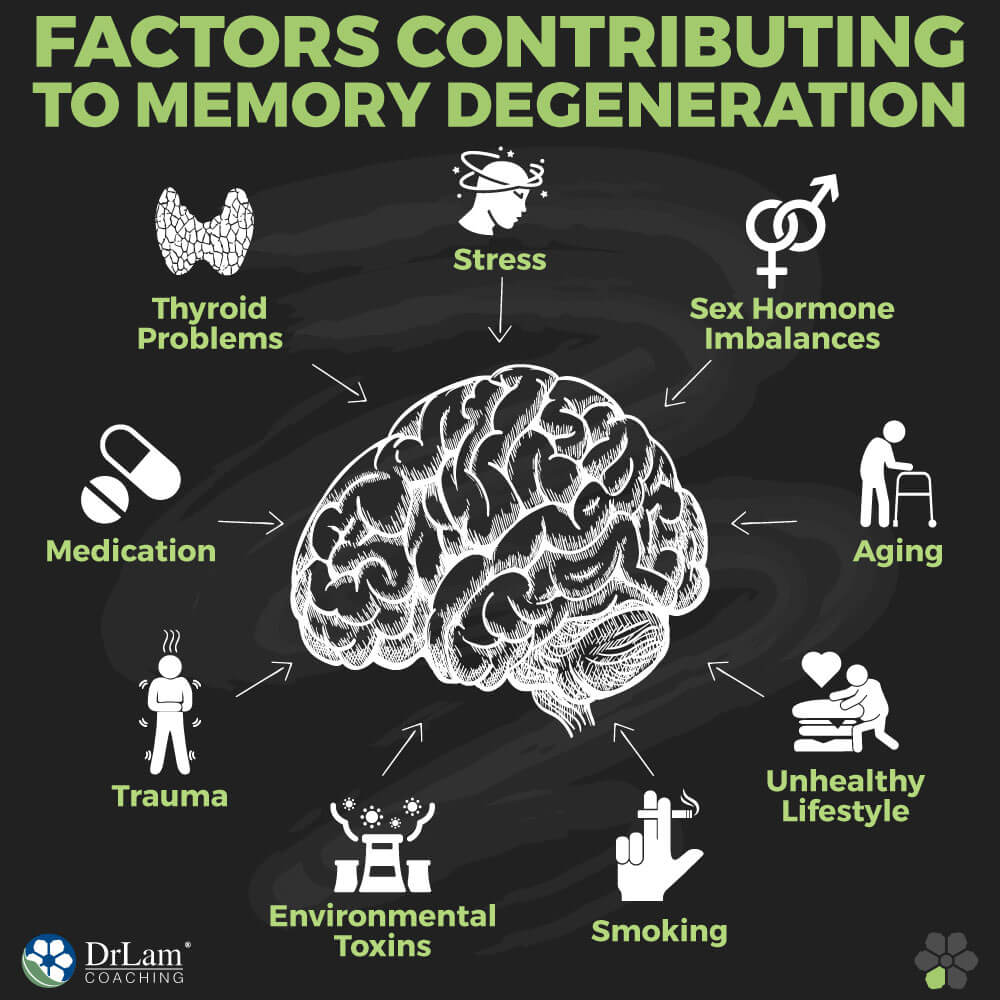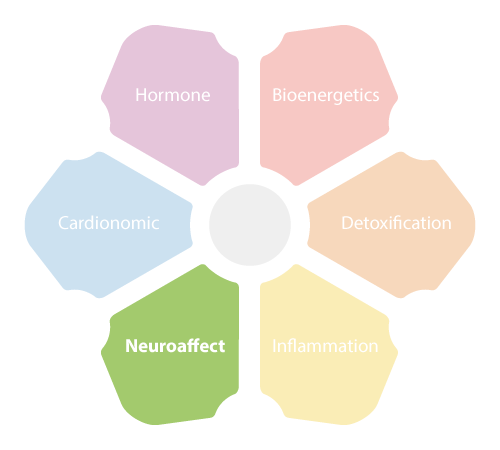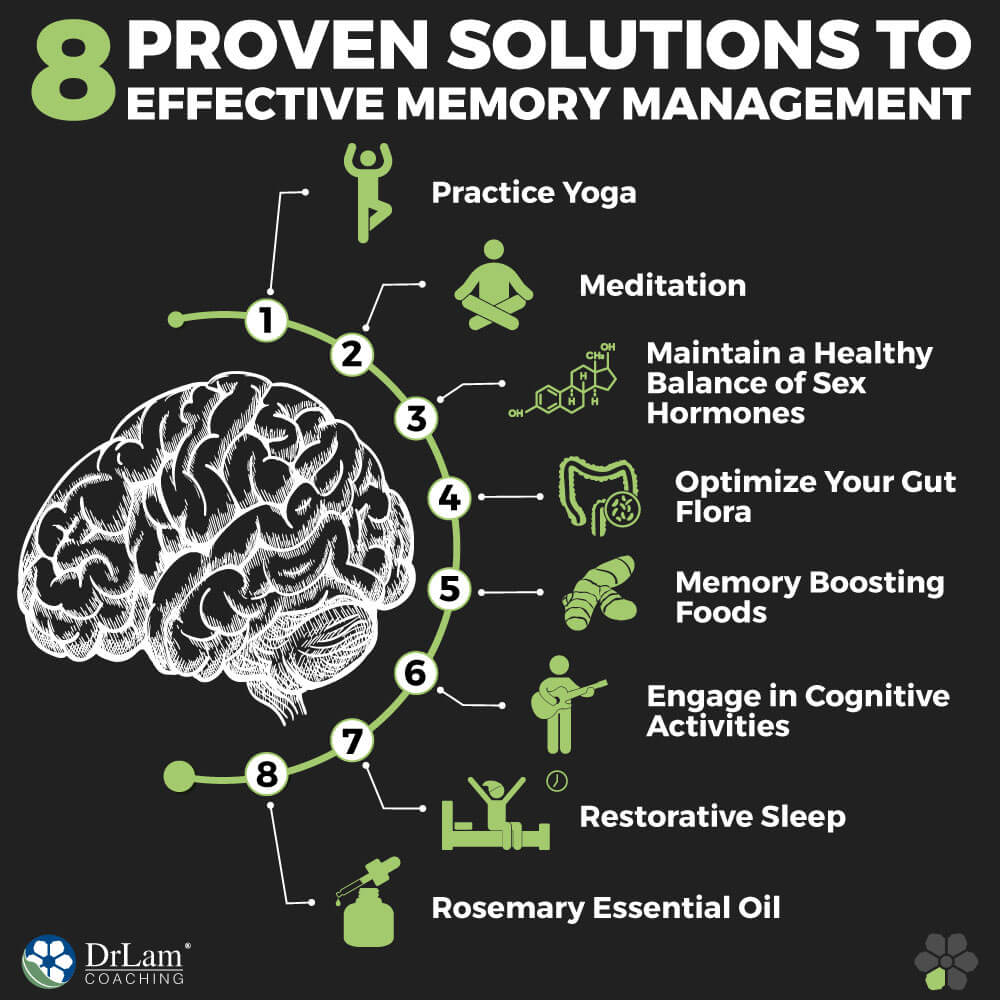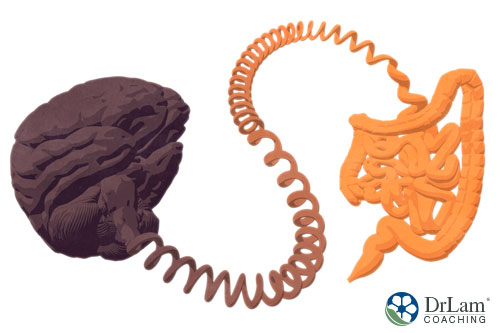
You’ve probably experienced forgetful moments many times in your life. Forgetting things on occasion is totally normal, for example, when you’re in a hurry, nervous, or just really stressed out. However, as you age, your memory may start to decline causing you to misplace things more often. Or you may even find it difficult to recall an old friend’s name. The risk of developing a cognitive disorder such as dementia or Alzheimer’s disease increases. Fortunately, there are natural solutions you can use to maintain optimal brain function. These so-called memory management strategies can help you fight off the onset of brain degeneration, boost your cognitive abilities, and ensure your brain continues to function at its peak.
Declining memory can be a stressful experience for you and for your loved ones. Luckily, memory management can minimize your risk of memory loss and help your brain function at its peak. Symptoms of declining memory include:

The above symptoms indicate mild cognitive decline which can worsen over time and with age. The good news is that the human brain exhibits neuroplasticity. This means that neurons or nerve cells of your brain continue to grow throughout life. Thus, your brain is ever-changing and capable of adapting to the changes. It is important to understand that the brain grows only when you give it the chance to do so. Interestingly, this rapid growth is usually in response to mental activities.
Stimulating your brain encourages new neurons to grow and strengthen your brain’s neural network. Learning new things activates the neural network. But in the absence of mental stimulation, neglected neurons start to gradually degenerate, paving the way for cognitive disorders and poor memory. Fortunately, managing your memory from the early stages of life can help ensure optimal cognitive health. Understanding how your brain functions, eliminating factors that cause brain degeneration, and following certain protocols to improve memory can all help to minimize your risk of cognitive issues in the future.
Here’s how memory management can support brain health:
Certain regions of the brain degenerate with age, which can affect your memory. However, natural memory management techniques that focus on preventing brain degeneration can boost your memory.
For a long time, scientists believed the brain to be static and that it slowly wears out over time like other organs of your body. But further research revealed that the brain exhibits neuroplasticity. We now know that the brain has the capacity to rewire itself throughout life and neurons can alter their activities in response to stimuli or changes in the environment. Neurons are the main cell type of the nervous system. They process and transmit information to other nerve cells, as well as to glands and muscles, around the body. And communication inside your brain relies on these neural connections.
Your brain’s neural connection pattern or connectome represents the flow of information around all the neural circuits in the brain and their functions. The connectome is essentially a map of your brain’s neural connections. Identifying your brain’s connectome can help you to analyze and understand the brain’s complex nature and how it works to generate behaviors, emotions, and cognition. And how memory management solutions can enhance your brain’s neuroplasticity.
Interestingly, neuron growth rapidly increases in response to new mental activities. The most utilized regions of the brain grow and strengthen while unutilized regions weaken and begin to degenerate. For instance, when you experience anxiety, the region of your brain responsible for this feeling grows and strengthens. Meanwhile, more positive regions associated with peace and tranquility are neglected and slowly degenerate. Thus, memory management focuses on growing and strengthening the neurons related to peace, learning, and cognitive ability.
Your experiences, habitual thoughts, responses to situations, and behaviors shape the brain’s connectome. Engaging in a particular pattern of thought or a certain feeling will strengthen the corresponding area of your brain. This can make it difficult to change chronic or over-learned patterns. Memory management can effectively rewire your brain’s neural network to prevent degeneration of neurons and promote healthy brain function. The brain is capable of recouping after experiencing environmental changes or disease. And memory management allows you to specifically focus on strengthening the positive regions of your brain.

Various factors can contribute to brain degeneration. The first step in effective memory management is to recognize the underlying causes and address the issues.
The following factors contribute to memory decline:
 Stress is the root cause of numerous health issues including memory degeneration. Constant stress modifies the pattern of your brain’s neural network. This changes the way neurons communicate with each other, thereby affecting normal thought processes. Your body deals with stress by activating the NeuroEndoMetabolic (NEM) Stress Response System. The body’s in-built stress response is a delicate network of various organs and six circuits working together to keep you safe and combat stress. The adrenal glands—a pair of walnut-shaped glands located above the kidneys—are an integral part of the NEM stress response system.
Stress is the root cause of numerous health issues including memory degeneration. Constant stress modifies the pattern of your brain’s neural network. This changes the way neurons communicate with each other, thereby affecting normal thought processes. Your body deals with stress by activating the NeuroEndoMetabolic (NEM) Stress Response System. The body’s in-built stress response is a delicate network of various organs and six circuits working together to keep you safe and combat stress. The adrenal glands—a pair of walnut-shaped glands located above the kidneys—are an integral part of the NEM stress response system.
During stressful situations, the NEM signals to your adrenal glands via the Hypothalamus-Pituitary-Adrenal (HPA) axis and they start producing extra cortisol. However, constant stress can overburden the adrenal glands until they are no longer able to secrete adequate amounts of cortisol. This reduces your body’s natural stress-fighting ability and can lead to Adrenal Fatigue.
If you frequently experience extreme fatigue along with other symptoms, such as anxiety, low energy levels, low concentration levels, insomnia, constipation, difficulty waking up, brain fog, stubborn weight gain, low libido, and cravings for salty and fatty foods, then you may be dealing with Adrenal Fatigue Syndrome (AFS).
The Neuroaffect Circuit of the NEM Stress Response System comprises the brain, autonomic nervous system, and the gut. Because it is responsible for controlling sleep, cognition, and mood, any imbalances in this circuit can lead to anxiety, lack of concentration, mood swings, and insomnia. Minimizing stress can help your body maintain healthy cortisol levels which are essential for your NEM stress response system and in particular, your Neuroaffect Circuit.
Pregnenolone is a sex hormone secreted by adrenal glands, along with estrogen and testosterone, and is responsible for controlling memory. Any imbalance in this hormones can result in impaired cognitive function, poor memory, mood swings, difficulty concentrating, memory degeneration, fatigue, and reduced libido. Therefore, it is important to maintain a healthy balance of sex hormones for effective memory function. Aging leads to a decline in sex hormones, increasing your risk of developing memory issues such as dementia.
Your brain’s neuroplasticity allows new neurons to grow throughout life. As mentioned earlier, the brain is ever-changing and can adapt to many different situations. However, the natural aging process causes certain cognitive functions to gradually weaken, whereas others actually improve. Certain regions of the brain such as the hippocampus shrink in size and the protective myelin sheath of nerve fibers gradually deteriorates, slowing down the speed of communication between neurons. Further, some receptors on the neuron surface responsible for communication between neurons may not function as they should.
Aging is a major risk factor for various brain diseases. Alzheimer’s disease and dementia are caused by clumps of abnormal proteins and plaques that damage brain tissue. Furthermore, aging can promote other health issues, such as sleep deprivation, heart disease, diabetes, reduced sex hormones, and depression, that can interfere with normal brain functions and affect your cognitive ability. This may be the reason you find it difficult to recall the name of an old friend. Memory management can help you minimize the risk of developing age-related memory loss.
An unhealthy lifestyle can be a major hurdle in the path toward effective memory management. Lack of exercise combined with poor food choices accelerate aging and brain degeneration. One survey revealed that women with cardiovascular problems are 41 percent more likely to develop dementia compared to those with good cardiovascular fitness.
 Processed foods trigger inflammation, exerting stress on your body. Inflammation also modifies the pattern of your brain connectome, affecting thought processes and memory. Consider eliminating foods such as sugar, refined flour, processed cheese, and sugary drinks that trigger inflammation in your body. Certain vitamin deficiencies such as vitamin D and vitamin B12 deficiencies can increase your risk of developing dementia. A recent study published in JAMA Neurology linked low vitamin D levels with cognitive decline.
Processed foods trigger inflammation, exerting stress on your body. Inflammation also modifies the pattern of your brain connectome, affecting thought processes and memory. Consider eliminating foods such as sugar, refined flour, processed cheese, and sugary drinks that trigger inflammation in your body. Certain vitamin deficiencies such as vitamin D and vitamin B12 deficiencies can increase your risk of developing dementia. A recent study published in JAMA Neurology linked low vitamin D levels with cognitive decline.
When you smoke, you are at risk of developing several diseases including cognitive impairment. Research has revealed that people who smoke cigarettes are at a 45 percent higher risk of developing brain disorders, such as dementia, compared to non-smokers. Smoking hinders the blood supply to the brain causing memory lapses. Studies show that smokers have an abnormal accumulation of proteins in the brain that interferes with the processing and relay of information. This can lead to a rapid decline in brain function. Moreover, according to another recent study, exposure to second-hand smoke and smokeless tobacco can also increase your risk of developing dementia.
Exposure to environmental toxins triggers stress inside your body. Further, toxins from the environment can enter your body and interfere with the functioning of its various systems. Toxic overload can affect your gut flora. This, in turn, can lead to imbalances in your NEM circuits and dysfunction of organs, thus, disturbing the entire NEM Stress Response System. The brain and gut are interconnected; therefore, poor gut health can negatively affect brain health.
Trauma can make life extremely stressful. Sometimes, an incident will continue to haunt you even years after the traumatic event. According to estimates, over 70 percent of US adults experience trauma at some point in their lives and of those, about 20 percent develop a condition known as post-traumatic stress disorder (PTSD). The psychiatric disorder occurs following a life-threatening event, either one you have witnessed or experienced yourself, and causes dysregulation of the brain region responsible for regulating memory and emotions.
Medications are supposed to provide relief from illness, but unfortunately, they come with many side effects. Researchers have linked the use of anticholinergic drugs with cognitive decline. Recent studies used brain imaging techniques to assess the impact of anticholinergic drugs on the brain. Findings show lowered brain metabolism increased brain atrophy and memory decline after anticholinergic drug use. Further, scientists suggest using certain anticholinergic sleep aids could increase your risk of dementia. Instead, memory management provides a natural solution that could help you sleep better while boosting cognitive function.
Although the thyroid gland does not play a direct role in brain function, most memory problems are indicative of a thyroid disorder. An overactive or underactive thyroid can lead to poor memory and low concentration levels. People with thyroid disorders often develop dementia symptoms.

There are natural solutions that can help restore your brain health, improve memory, and boost cognitive function. Here are seven proven memory management techniques to boost your memory and optimize brain health.
 Practicing yoga is the first step you should take toward effective memory management. The organized combination of postures, breathing, and meditation can revitalize your body and mind. Yoga can also help your organs and circuits, including the Neuroaffect Circuit and the entire NEM Stress Response System, function optimally.
Practicing yoga is the first step you should take toward effective memory management. The organized combination of postures, breathing, and meditation can revitalize your body and mind. Yoga can also help your organs and circuits, including the Neuroaffect Circuit and the entire NEM Stress Response System, function optimally.
Here are some incredible health benefits of practicing yoga:
Studies show that compared to mind games, yoga is more effective at boosting your brain health and memory. The positive effects of yoga on the Neuroaffect Circuit are nothing short of stunning. Practicing yoga requires coordination between your body, mind, and soul. This helps your entire body relax, relieves stress, opens up your mind, and positively changes your thought processes. These benefits also contribute to rewiring and strengthening your brain’s neural networks related to peaceful experiences, while enhancing the flexibility of your neurons, and creating strong neural pathways. Yoga practice helps your brain adapt to change—a process called neurogenesis—as well as stay flexible and grow new neurons.
Yoga increases the production and secretion of neurotrophic growth factor which is known to stimulate the growth of neural connections. Recent research shows that practicing yoga increases the grey matter volume in regions of your brain associated with perception, social behavior, memory processing, cognitive function, self-awareness, interpersonal experiences, impulse control, motor control, emotional decision making, and rewards.
As an important tool in memory management, meditation has powerful healing effects on both the brain and body. Practicing meditation recharges your brain, boosts memory, and provides relief from stress and depression. Studies have linked mindfulness meditation to increased neurons in regions of the brain related to memory and compassion. Post-meditation, MRI scans showed increased brain matter density in the compassion, learning, and memory centers of the hippocampus. In the same study, participants who practiced meditation for around 27 minutes a day for eight weeks exhibited a remarkable reduction of gray matter in the amygdala, the stress and anxiety center of the brain.
Regularly practicing meditation can relieve depression, reduce stress, induce a sense of calm, and strengthen the brain’s neural connections associated with peacefulness. Furthermore, research shows mindfulness meditation strengthens regions of the brain related to memory, learning, sense of self, empathy, and emotion.
Sex hormones directly influence your brain function. Therefore, maintaining a healthy balance of sex hormones is crucial to your memory function. Sex hormones are produced in the ovaries and testes. The Hormonal Circuit is also a part of the NEM system and includes the ovaries/testes, adrenal glands, and thyroid. The circuit is responsible for regulating body temperature, stress hormones (including cortisol), and thyroid function. Imbalances within this circuit can cause fatigue, miscarriage, reduced libido, weight gain, hair loss, and a sluggish thyroid.
Since the NEM Stress Response System is a closely linked network of various circuits and organs, any imbalance in Hormonal Circuit can also affect the Neuroaffect circuit, which increases your risk of cognitive issues. Managing stress, eating an anti-inflammatory diet, healthy lifestyle choices, getting enough restorative sleep, and taking baths with Epsom salts can help keep your sex hormones and Hormonal Circuit balanced.
 Your brain and gut are intimately connected and interact with each other in unique ways. Therefore, your gut flora can directly affect your brain health. For this reason, the gut is referred to as the second brain and is responsible for making many of the body’s important neurotransmitters. Serotonin is one of the neurotransmitters made in your gut and regulates mood.
Your brain and gut are intimately connected and interact with each other in unique ways. Therefore, your gut flora can directly affect your brain health. For this reason, the gut is referred to as the second brain and is responsible for making many of the body’s important neurotransmitters. Serotonin is one of the neurotransmitters made in your gut and regulates mood.
Unhealthy eating habits destroy your gut flora and can, therefore, affect your brain health, mood, and behavior. On the other hand, raw cheese, raw cultured dairy products like yogurt, healthy fats, omega-3 fatty acids, sprouted seeds, and traditional fermented foods, such as kimchi, all promote healthy gut flora, which is essential for optimal cognitive function.
Eating a nutritious diet ensures a healthy body and mind. Unhealthy food habits trigger stress by creating inflammation in your body. This, in turn, alters your brain’s neural/wiring system and affects the way neurons communicate with each other. Make sure to eliminate foods that trigger inflammation, including packaged, canned, and processed foods. Replace unhealthy fats with healthy fats like olive oil, seeds, and nuts.
A Mediterranean diet containing fresh vegetables, fruits, and healthy nuts can help minimize inflammation and support healthy memory. Foods such as walnuts, cauliflower, celery, broccoli, and parsley are rich in antioxidants, which stimulate the production of neurons in your brain and boost brain health. Certain foods are known to boost memory and brain health.
Top memory boosting foods include
Turmeric is a versatile spice with healing properties and profound health benefits. This is mainly thanks to the curcumin it contains, a potent anti-inflammatory agent that supports brain health. This spice is also full of powerful antioxidants that boost the immune system and improve oxygen circulation in the brain to keep you alert. Rosemary contains carnosic acid that can protect the brain from neurodegeneration and help fight free radicals linked to cognitive illnesses such as dementia and Alzheimer’s disease. Beets are high in cancer-protecting antioxidants and natural nitrates that boost blood flow to your brain, thereby enhancing mental performance.
Coconut oil has powerful anti-inflammatory properties and can therefore support a healthy gut and memory. Blueberries are high in antioxidants, vitamins, and gallic acid, and protect your brain from stress and degeneration. Olive oil is rich in antioxidant polyphenols that help improve memory, learning, and fight against Alzheimer’s disease. Powerful flavonols and anti-inflammatory agents found in dark chocolate help lower blood pressure and improve blood circulation to the heart and brain. Green leafy vegetables are high in vitamins, minerals, and antioxidants that support brain health and fight memory degeneration.
 Your brain’s neuroplasticity means your neurons can grow and adapt to changes. Keeping yourself engaged in cognitive activities boosts this neuroplasticity. Therefore, learning new things, playing a musical instrument, memory games like chess, juggling, and engaging in cognitive activities can all stimulate your brain and encourage the growth of neurons while strengthening the connections between them. These activities can give your memory and brain health an incredible boost.
Your brain’s neuroplasticity means your neurons can grow and adapt to changes. Keeping yourself engaged in cognitive activities boosts this neuroplasticity. Therefore, learning new things, playing a musical instrument, memory games like chess, juggling, and engaging in cognitive activities can all stimulate your brain and encourage the growth of neurons while strengthening the connections between them. These activities can give your memory and brain health an incredible boost.
In addition, music can provide a deep emotional connection. So, playing a musical instrument has a powerful stimulating effect on the brain. Research suggests that learning to play a musical instrument at an early age can have a positive impact on the structure of your brain. Moreover, musical training can help correct brain injuries and disabilities in some cases.
Constant stimulation of neurons through mental activities strengthens your brain connectome and improves your memory. Thus, cognitive engagement is a crucial tool in memory management.
Restorative sleep is another key tool in memory management and Adrenal Fatigue recovery. Getting adequate sleep is essential for recharging your body and mind and can improve your cognitive ability, enhance your memory, and enable you to think clearly. Studies show that people with sleep apnea or snoring problems are more prone to early cognitive impairment. Untreated sleep apnea can increase the risk of memory degeneration and Alzheimer’s disease.
Poor sleep deteriorates neurons and hampers the neuroplasticity of your brain. Disturbed sleep can modify gene expression pathways that may be important for memory and synaptic plasticity. Moreover, poor sleep can disturb your natural circadian rhythm, placing additional stress on your body. Constant stress modifies your brain connectome, causes degeneration of your brain, and disturbs the hormonal circuit.
Getting a good night of sleep detoxifies your brain, boosts memory, improves performance, and also supports Adrenal Fatigue recovery. Further, synaptic connections in your brain are strengthened while you sleep. Restorative sleep helps maintains your body’s circadian rhythm, supports a healthy balance of sex hormones, fights stress, and strengthens your connectome.
 Essential oils are known to have a therapeutic and calming effect on your brain and body. Rosemary essential oil can help improve memory and brain function. Consider adding a few drops to the bathtub or use it in a diffuser. You can also mix rosemary essential oil with other carrier oils and massage it into your body.
Essential oils are known to have a therapeutic and calming effect on your brain and body. Rosemary essential oil can help improve memory and brain function. Consider adding a few drops to the bathtub or use it in a diffuser. You can also mix rosemary essential oil with other carrier oils and massage it into your body.
Researchers have been studying the brain in the hope of deciphering how it works, what causes illnesses like dementia, and how to prevent cognitive decline. Mental distraction, a sedentary lifestyle, and poor diet are known to negative impacts on brain function and can make you more susceptible to neurological disorders.
A number of studies have focused on exercise and memory improvement. The hippocampus is the area of your brain that determines intelligence and continues to retract and expand through life, as revealed by MRI scans. Since exercise is thought to promote brain function, this led researchers to another hypothesis: the hippocampus expands in response to regular moderate exercise.
Memory starts to deteriorate with age. Some older people develop Alzheimer’s disease, while others end up with dementia, but many do not suffer from any memory issues at all. In one study, researchers investigated the effect of walking at a moderate pace for 45 to 50 minutes three times a week on memory. During the year-long study, they observed the part of the brain associated with memory before and after exercise. Post-exercise, the region was around 2 percent larger, based on MRI brain scans.
A second study looked at the effect of weightlifting on thinking and memory functions of older women already experiencing moderate cognitive decline. Women who lifted weights twice a week performed better in both thinking and memory tests. Finally, a third study focused on the effects of balance and strength exercises on memory. The researchers again used MRI to observe the memory region of the brain before and after exercise. After one year of performing the recommended exercises, memory improved in elderly people.
Similar to other studies on Alzheimer’s disease, the present findings do not provide a clear solution for preventing cognitive decline. However, the findings show that regular moderate exercise does improve memory, enhance mental capacity, and hinder the progression of cognitive disorders.
Each person possesses a different level of physical fitness and varying capacity to undertake exercise. The most critical point to take from these findings is that keeping yourself regularly engaged in some form of physical exercise can improve your cognitive health. It’s quite amazing that even just a few minutes of brisk walking a few times a week can enhance your cognitive skills and prevent memory degeneration. Exercise has immense benefits for your mind and body. Regular moderate exercise helps to relieve stress and anxiety, balance your hormones, and speed up nutrient absorption from food – and supports your overall well-being. Therefore, regular workouts are an important part of memory management. Moreover, regular physical workouts can help combat the symptoms of Adrenal Fatigue by reducing stress.
 There has been an alarming rise in the number of people developing cognitive disorders such as dementia and Alzheimer’s disease. With the natural aging process, remembering simple things, carrying out everyday tasks, and learning new activities becomes more challenging for some. Fortunately, you can adopt several natural solutions for mitigating memory decline.
There has been an alarming rise in the number of people developing cognitive disorders such as dementia and Alzheimer’s disease. With the natural aging process, remembering simple things, carrying out everyday tasks, and learning new activities becomes more challenging for some. Fortunately, you can adopt several natural solutions for mitigating memory decline.
Memory management can help minimize brain degeneration, enhance the neuroplasticity of your brain, encourage the growth of neurons, and strengthens your connectome. The various factors that contribute to memory degeneration include stress, unbalanced sex hormone levels, aging, an unhealthy lifestyle, smoking, environmental toxins, certain medications, trauma, and thyroid problems.
Memory management techniques provide a natural solution for improving brain function, boosting memory, preventing brain degeneration, and supporting cognitive health. Practicing yoga and meditation, maintaining a healthy balance of sex hormones, optimizing your gut flora by eating the right foods including memory boosting foods, engaging in mentally stimulating activities, and getting enough restorative sleep along with regular exercise can prove helpful in promoting memory, healthy brain function, and overall health. The Dr. Lam Coaching team offers a free** no-obligation phone consultation at +1 (626) 571-1234 where we will privately discuss your symptoms and what your options are. You can also send us a question through our Ask The Doctor system by clicking here.
Adrenal Fatigue symptoms include poor memory, difficulty concentrating, anxiety, and depression, on top of a weak body. Memory boosters and antidepressants can have side effects that worsen your symptoms. Memory management techniques are proven natural and effective solutions for improving cognitive function and brain health without conventional medicines.
